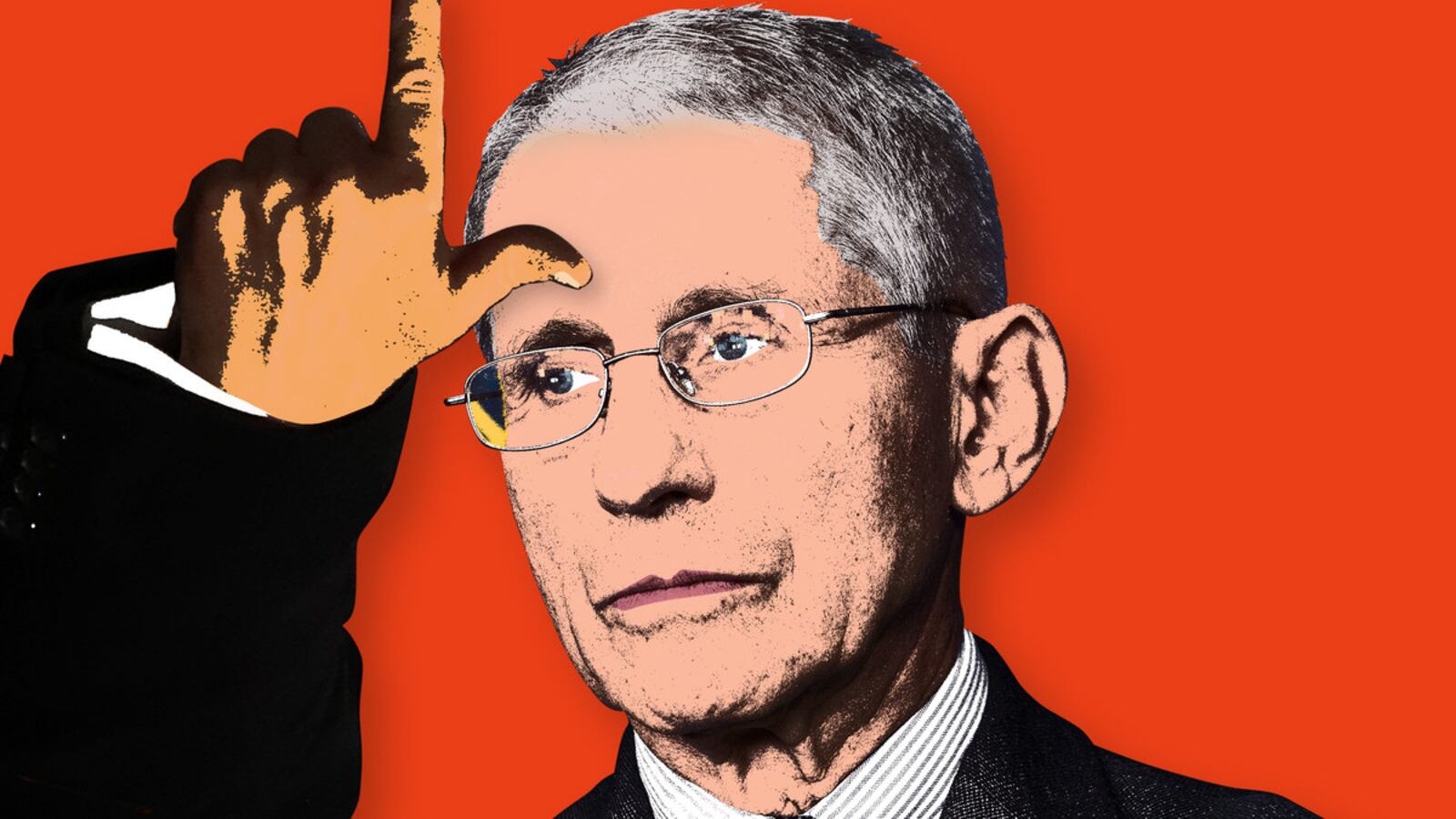A cadre of influential conservatives is growing increasingly convinced that the nation’s foremost infectious-disease expert, Dr. Anthony Fauci, is recklessly driving the nation to financial ruin—possibly even in a concerted attempt to undermine President Donald Trump. And in an effort to stop him, they’re resorting to tried and true methods: from public shaming, to online conspiracy theories, to lawsuits meant to unearth emails pertaining to his work.
At the heart of the effort to knock Fauci down a peg are some of the biggest luminaries in Trump’s orbit—including key figures who helped spearhead the campaign to undermine Hillary Clinton in the 2016 elections.
Steve Bannon, Trump’s former chief strategist, insisted in an episode of his podcast on Wednesday that Fauci had “set up President Trump for failure in the fall.” He was reacting to Fauci’s testimony before a Senate committee this week, during which Fauci questioned efforts by some elected officials, including a number of Trump allies, to “reopen” schools and businesses shuttered in an effort to control the spread of the coronavirus.
While certain Trump allies have given Fauci the benefit of the doubt, even as they disagree with his scientific and policy pronouncements, Bannon sensed something more sinister in his comments before the Senate.
“Understand this,” he said. “Tony Fauci has not been around from 1984 because he doesn’t know how to play the game. He is a master game-player.”
And Tom Fitton, the president of conservative legal advocacy group Judicial Watch, announced this week that his organization would be suing the National Institutes of Health in an effort to obtain Fauci’s communications about the coronavirus with the World Health Organization. Judicial Watch is seeking the records on behalf of the Daily Caller News Foundation, the right-leaning news outlet’s nonprofit investigative arm. Fitton said the records will show whether Fauci passed along misinformation from the WHO—possibly fed to the UN health agency by Chinese authorities—that may have hampered the U.S. coronavirus response by downplaying early signs of the virus’ transmissibility.
“The initial shutdown, I don’t believe there was anything malicious about it or mendacious,” Fitton said in an interview Thursday. But “then the ideology creeps in, and that’s where the distinctions start to arise.”
Fauci, in Fitton’s view, is emblematic of a class of bureaucrats that may be experts in their specific, esoteric fields, but take it upon themselves to try to steer national policy according to their own whims, without regard to the limits of their own expertise or the weight of competing policy priorities.
“They’ve got a particular expertise, and because they’re probably more liberal in their worldview, they thought yes, we can persuade entire states to shut down because we know better,” Fitton said. “The medical health establishment,” personified by Fauci, “came up with a plan to run an entire nation of 330 million people.”
Rare is the case where a leading scientist becomes a boogeyman in national politics. But the country finds itself in rare times. Fauci has served Republican and Democratic presidents alike but none like Trump, who has been as keen on monitoring Fauci’s media hits as he is at consuming his public-health policy advice. According to a White House official, the president has often played back TIVO’d Fauci interviews when he isn’t able to catch them live.
“The president knows how much the liberal media loves Dr. Fauci,” this official said. “There are times he thinks that can be played to [Trump’s] advantage. There are other moments when he finds it irritating.”
To a certain degree, efforts to target Fauci run major risks. Polls show that the public has far more confidence in his handling of the pandemic than they do in Trump’s. And even conservative stalwarts like Rep. Liz Cheney (R-WY) have rushed to Fauci’s defense.
But conservative distrust of Fauci is also evident in recent polling. A CBS News survey released Thursday showed that Americans have largely favorable views toward him, with 62 percent of respondents saying they trust Fauci and just 38 percent saying they don’t. But among Republicans, views are evenly split.
Among Democrats, Fauci’s standing borders on that of a folk hero. National organs of the party such as the Democratic Congressional Campaign Committee have purchased Facebook ads and blasted out fundraising emails warning supporters that Fauci’s ouster at Trump’s hands is imminent, and attempting to rally support for the ostensible voice of reason on the White House’s coronavirus task force.
And even Trump operatives are wary of going too far. While the president has notably soured on Fauci, Trump’s re-election campaign has used him as a crutch. In an email blasting Joe Biden, a Trump aide said that the nation’s “governors are, in fact, listening to Dr. Fauci, who helped develop the Trump Administration’s science-based guidelines to reopen America.”
But for some influential conservative pundits, Fauci is seen as at best misguided and at worst a malicious obstacle to Trump’s agenda and his political prospects in November. And for that reason, he has found himself on the receiving end of a host of fringey conspiracy theories blaming him for the damage ostensibly done by White House-backed policies to limit public gatherings and commercial activity in response to the virus.
This month, various hosts and regular commentators on the president’s favorite channel, Fox News, have been intensifying their offensive on Fauci. Host Laura Ingraham—who has doubled as a direct adviser to Trump during the coronavirus crisis—said on-air Tuesday that presumptive Democratic presidential nominee Joe Biden would “farm out critical decision-making to others like Dr. Fauci and other ‘unnamed’ scientists,” as she mocked Democrats for supposedly wanting the U.S. locked down until “the experts set you free.”
On Wednesday, Fox & Friends co-host Brian Kilmeade namechecked one of Trump’s preferred indicators for measuring a healthy economy, claiming that “every time [Fauci] talks, you can hear the stock market fall, and I don’t think he’s really factoring in what damage he’s doing.”
And earlier this month, Fitton appeared on the Fox Business show hosted by Lou Dobbs, one of the more prominent informal advisers to President Trump, during which Dobbs said that Fauci had been too “accommodating” to the WHO.
It doesn’t appear as though the president is on the verge of sacking Fauci, but he has looked for other, perhaps more benign outlets for his recurring annoyance with the doctor.
As The Daily Beast reported in April, Trump devoted part of this year’s Easter weekend to working the phones and asking close advisers: “What do you think of Fauci?” The president then capped off the holiday weekend by elevating a tweet that included the hashtag, “#FireFauci,” a burst of Twitter activity that Trump would later claim was no big deal.
That Sunday, following talk-show remarks made by Fauci that many interpreted as a swipe at the president’s sluggish response to the virus, notable Trump allies and surrogates quickly started messaging each other articles and documents on how Fauci himself had made flawed coronavirus predictions, and urged one another to circulate them widely and post them to social media, according to screenshots shared with The Daily Beast.
And at one point during the Easter break, Trump had privately griped that he had made Fauci a “star” and that barely anyone in the U.S. knew who he was until the president began placing him front-and-center and in front of the cameras during the administration’s coronavirus response. Indeed, not long after that weekend, NBC’s Saturday Night Live ended up lionizing Fauci, with actor Brad Pitt playing the doctor and then breaking character to personally thank Fauci at the end of the anti-Trump sketch.
This all predated Trump’s comments on Wednesday, during which the president publicly chastised Fauci for what he deemed “not an acceptable answer” on reopening American schools.









